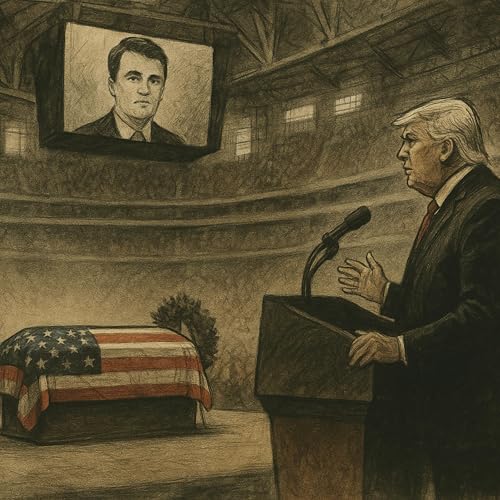
The Assassination of Charlie Kirk and the Detonation of the American Square
Échec de l'ajout au panier.
Échec de l'ajout à la liste d'envies.
Échec de la suppression de la liste d’envies.
Échec du suivi du balado
Ne plus suivre le balado a échoué
-
Narrateur(s):
-
Auteur(s):
À propos de cet audio
Charlie Kirk’s murder on a Utah stage in September 2025 was not just another grim entry in the catalog of American political violence. It was a detonation — the moment when a single blasting cap set off a chain reaction that no one could fully control. To understand it, we need less the vocabulary of day-to-day politics and more the physics of escalation.
In a nuclear weapon, you don’t need much fissile material to create an unimaginable blast. What you need are precisely shaped conventional charges — “explosive lenses” — timed to compress the core into criticality. Small charges, aimed correctly, unlock apocalyptic force. Political violence, as history shows, operates on the same principle. One bullet in Sarajevo, fired by a young nationalist named Gavrilo Princip, compressed the fragile alliances of Europe into total war. The Treaty of Versailles, meant to end that war, functioned instead as a pause that guaranteed another. Small detonations, brittle systems, spirals without ceilings.
Charlie Kirk’s assassination functioned as just such a lens. The man himself was controversial, adored on the right, despised on the left, mocked by late-night comedians, venerated by his followers as a cultural warrior and, in some quarters, even as a modern Saint Paul. But the meaning of his death lies less in the biographical details than in the cascade it triggered: presidential proclamations, half-staff flags, memorials filling stadiums, new laws drafted in grief and vengeance. Within hours, the online square divided into camps: those mourning, those jeering, those hunted for failing to mourn properly. Employers fired staffers who made jokes; activists doxxed students who cheered; even foreign governments issued statements of condolence or disdain. The assassination became implosion.
The reaction illustrates what I called, in an earlier essay, the ladder of escalation. Words treated as violence. Violence treated as legitimacy. Cancel culture feeding into martyrdom. Martyrdom feeding into repression. Each rung climbs higher until there is no way down. History is littered with moments where a single flashpoint cascaded into an epochal rupture: Sarajevo in 1914, Kristallnacht in 1938, Dallas in 1963. What begins as an act of brutality quickly becomes a referendum on legitimacy itself.
Why is Kirk’s case so combustible? Because he was not a marginal figure. He was beloved by a sitting president, courted by world leaders, followed by millions. He represented, to his supporters, the silent majority finally speaking. To his enemies, he embodied the weaponization of grievance. That polarity meant his assassination could not be absorbed as a tragic crime; it had to be read as symbol, as trigger, as proof.
And once symbols replace arguments, escalation is automatic. Trump promised a crackdown on enemies. JD Vance vowed institutional purges. Cardinals and pop stars consecrated Kirk as martyr. Meanwhile, conspiracy theories bloomed: Was the shooter Antifa? A Groyper? A false-flag pawn of Ukraine, Israel, Russia? Like radiation after a blast, the speculation itself became toxic fuel.
The lesson is the same one Sarajevo teaches: small charges, aimed at brittle systems, create explosions whose shockwaves last generations. If every offensive post is treated as treason, if every death is weaponized into mandate, then the republic ceases to be a forum and becomes instead a minefield.
The answer, paradoxically, is mercy. Protect the square. Let ugly words be answered with argument, not annihilation. Let crimes be punished through law, not mobs. Otherwise, Kirk’s death will not be remembered as a tragedy but as a trigger — the moment America’s fissile material reached critical mass.


